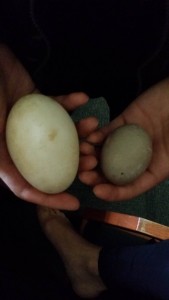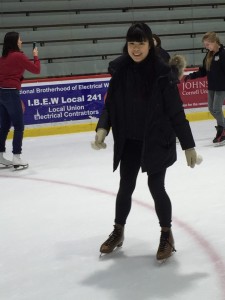Who knew we had such a renowned farmer’s market right here at Ithaca? I went on this trip simply as a study break, but I ended up having more fun than I had imagined. The food, the music, the people! It was all so pleasant that I lost track of time and I didn’t want to leave.
My first stop was the Swamp Road Baskets! I looking at the baskets with my friend, and I remember gasping at the price because a small basket was $165. We were both surprised and wondered what kind of person would pay that much for a simple basket, but I argued that it’s possible that it’s very good material and it’s the work of a master craftsman. My friend thought it was unlikely. However, when we watched the craftsman (we later learned his name was Jamin Uticone) work on a basket, we saw how skilled he was and my friend and I both thought, “I want a basket now.” How ironic!
We also passed by the stall with the Apple Donuts! We enjoyed a conversation with the stall owner before buying some apple donuts from him. I personally don’t like cinnamon, but when I tried these donuts, they were amazing! We’re planning on going back next week for more 🙂 We also ended up buying 2 goose eggs and a half dozen duck eggs. Prior to purchasing them, I didn’t know that they were richer in texture and flavor, so when we cooked them later that night, I was pleasantly surprised. The goose egg was GIGANTIC! (In the picture, you can see the difference in size between a duck egg, which is slightly larger than a hen’s egg, and the goose egg!)
The Ithaca Farmers’ Market was such a great experience; I’ve heard that people from across the country come to Ithaca for the Farmers’ Market. I loved the atmosphere there, and I realize how blessed we are to have the Farmers’ Market so accessible to us.


